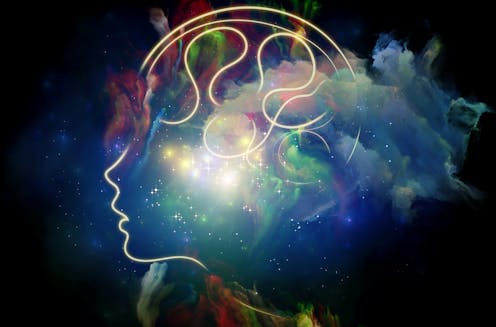We make thousands of unconscious decisions every day. Here's how your brain copes with that
- Written by Gina Cleo, Assistant Professor of Habit Change, Bond University

Do you remember learning to drive a car? You probably fumbled around for the controls, checked every mirror multiple times, made sure your foot was on the brake pedal, then ever-so-slowly rolled your car forward.
Fast forward to now and you’re probably driving places and thinking, “how did I even get here? I don’t remember the drive”. The task of driving, which used to take a lot of mental energy and concentration, has now become subconscious, automatic – habitual.
But how – and why – do you go from concentrating on a task to making it automatic?
Habits are there to help us cope
We live in a vibrant, complex and transient world where we constantly face a barrage of information competing for our attention. For example, our eyes take in over one megabyte of data every second[1]. That’s equivalent to reading 500 pages of information or an entire encyclopedia every minute.
Just one whiff of a familiar smell[2] can trigger a memory from childhood in less than a millisecond, and our skin[3] contains up to 4 million receptors that provide us with important information about temperature, pressure, texture, and pain.
And if that wasn’t enough data to process, we make thousands of decisions[4] every single day. Many of them are unconscious and/or minor, such as putting seasoning on your food, picking a pair of shoes to wear, choosing which street to walk down, and so on.
Some people are neurodiverse, and the ways we sense and process the world differ. But generally speaking, because we simply cannot process all the incoming data[5], our brains create habits – automations of the behaviours and actions we often repeat.
Read more: Neurodiversity can be a workplace strength, if we make room for it[6]
Two brain systems
There are two forces that govern our behaviour: intention and habit. In simple terms, our brain has dual processing systems[7], sort of like a computer with two processors.
Performing a behaviour for the first time requires intention, attention and planning – even if plans are made only moments before the action is performed.
This happens in our prefrontal cortex. More than any other part of the brain, the prefrontal cortex is responsible for making deliberate and logical decisions. It’s the key to reasoning, problem-solving, comprehension, impulse control and perseverance. It affects behaviour via goal-driven decisions[8].
For example, you use your “reflective” system (intention) to make yourself go to bed on time because sleep is important, or to move your body because you’ll feel great afterwards. When you are learning a new skill or acquiring new knowledge, you will draw heavily on the reflective brain system to form new memory connections in the brain. This system requires mental energy and effort.
Read more: Here's what happens in your brain when you're trying to make or break a habit[9]
From impulse to habit
On the other hand, your “impulsive” (habit) system is in your brain’s basal ganglia[10], which plays a key role in the development of emotions, memories, and pattern recognition. It’s impetuous, spontaneous, and pleasure seeking.
For example, your impulsive system might influence you to pick up greasy takeaway on the way home from a hard day at work, even though there’s a home-cooked meal waiting for you. Or it might prompt you to spontaneously buy a new, expensive television. This system requires no energy or cognitive effort as it operates reflexively, subconsciously and automatically.
When we repeat a behaviour in a consistent context, our brain recognises the patterns and moves the control of that behaviour from intention to habit. A habit occurs when your impulse towards doing something is automatically initiated because you encounter a setting in which you’ve done the same thing in the past[11]. For example, getting your favourite takeaway because you walk past the food joint on the way home from work every night – and it’s delicious every time, giving you a pleasurable reward.
Shortcuts of the mind
Because habits sit in the impulsive part of our brain, they don’t require much cognitive input or mental energy[13] to be performed.
In other words, habits are the mind’s shortcuts, allowing us to successfully engage in our daily life while reserving our reasoning and executive functioning capacities for other thoughts and actions.
Your brain remembers how to drive a car because it’s something you’ve done many times before. Forming habits is, therefore, a natural process that contributes to energy preservation[14].
That way, your brain doesn’t have to consciously think about your every move and is free to consider other things – like what to make for dinner, or where to go on your next holiday.
Read more: 'What shall we have for dinner?' Choice overload is a real problem, but these tips will make your life easier[15]
References
- ^ over one megabyte of data every second (www.ncbi.nlm.nih.gov)
- ^ familiar smell (pubmed.ncbi.nlm.nih.gov)
- ^ our skin (doi.org)
- ^ we make thousands of decisions (www.emerald.com)
- ^ all the incoming data (www.sciencedirect.com)
- ^ Neurodiversity can be a workplace strength, if we make room for it (theconversation.com)
- ^ dual processing systems (www.tandfonline.com)
- ^ goal-driven decisions (www.cambridge.org)
- ^ Here's what happens in your brain when you're trying to make or break a habit (theconversation.com)
- ^ basal ganglia (www.annualreviews.org)
- ^ in the past (bmcpsychology.biomedcentral.com)
- ^ James Sutton/Unsplash (unsplash.com)
- ^ don’t require much cognitive input or mental energy (doi.org)
- ^ energy preservation (psycnet.apa.org)
- ^ 'What shall we have for dinner?' Choice overload is a real problem, but these tips will make your life easier (theconversation.com)
















